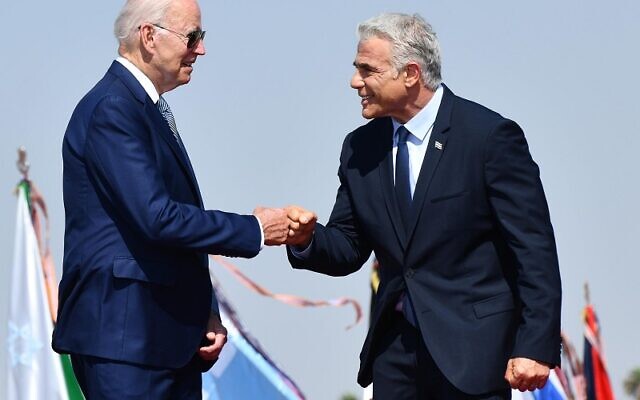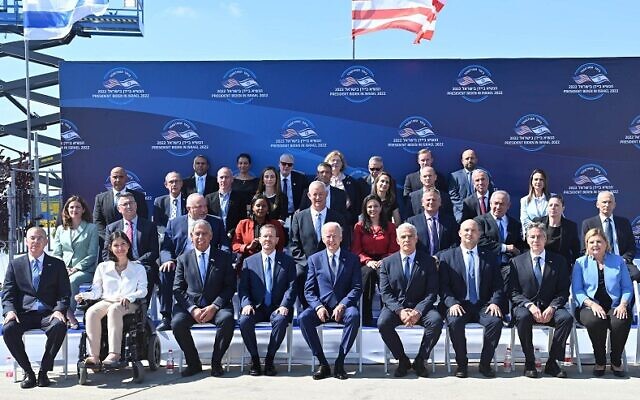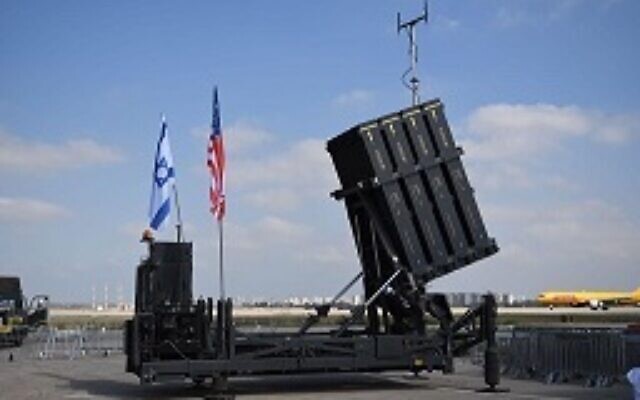Biden Gave Bear Hug to Israel During Recent Trip
While the U.S. didn’t ask anything of Israel, it did of Saudi Arabia.

For all the attention and hype that President Joe Biden’s short trip to the Middle East produced, analysts and pundits agree that the success of his visit to Israel and Saudi Arabia will only become clear in the next weeks or months.
“Overall, expectations were limited,” said Tel Aviv-based journalist and Israel Policy Forum’s Policy Adviser Neti Zilber. “No breakthroughs were expected” and there were “no major mistakes or surprises.” In that respect, Zilber added, the trip was a “success.”
From Israel’s perspective, it was probably a mixed bag. Lara Friedman, president of the Foundation for Middle East Peace, said that the Biden Administration’s intention was to give Israel a “bear hug,” to “hug as close as possible, because that is how Biden genuinely feels.” Friedman, who was a foreign service officer in the U.S. consulate in Jerusalem in the early 1990s, told the AJT that the U.S. didn’t ask for anything from the Israelis – unlike the Saudis – so there were no issues.

And much of the Israeli press emphasized the warmth they felt from Biden. The Biden Administration didn’t pressure Israel to make peace with the Palestinians and it re-emphasized the Abraham Accords, the economic and weapons agreement Israel signed with Bahrain, the United Arab Emirates, Sudan and Morocco.
On the other hand, as Israel Policy Forum’s chief policy officer Michael Koplow pointed out, progress on normalization with Saudi Arabia during Biden’s trip “fell short of Israel’s expectations.”
Saudi Arabia did announce overflight rights to all commercial carriers. Israeli Prime Minister Yair Lapid celebrated the decision as “the first official step of normalization with Saudi Arabia.” In fact, allowing Israeli airlines to fly over Saudi Arabia significantly shortens the flights from Israel to popular destinations like India, saving fuel and cutting costs.
Pointedly, Biden’s direct flight to Saudi Arabia, at the conclusion of the Israel part of his trip, was the first official such flight in history.

But the president’s visit began July 13 in Israel. After being welcomed at Ben Gurion airport by a number of Israeli officials, Biden’s first visit was a briefing with Defense Minister Benny Gantz about the Iron Dome, which the U.S. has helped Israel pay for.
Along with Lapid, Biden signed the “Jerusalem Declaration,” stating that the U.S. is committed to “building a robust regional architecture; to deepen the ties between Israel and all of its regional partners; to advance Israel’s regional integration over time; and to expand the circle of peace to include ever more Arab and Muslim States.”
In reaction to that signing, the Israeli-American Council stated: “The historic Jerusalem Statement is a testament to the unbreakable Israel-US alliance, the mutual goal of protecting American and Israeli lives, and is an important milestone in the relationship of the two countries. The US-Israel relationship and shared values should always be above politics. We are grateful to the U.S. for the unwavering support and commitment to Israel’s security, and as Israelis and Americans, we are proud to see the ever-strengthening ties between the two countries.”

In his remarks, Lapid noted that “in March 1965, on Dr. Martin Luther King’s famous march from Selma to Montgomery, walking beside him in the front row was a Jewish rabbi, Rabbi Abraham Joshua Heschel. When he returned home that day, Rabbi Heschel wrote in his diary: ‘Today, I felt my legs were praying.’ In the State of Israel, Mr. President, our legs pray every single day. Nothing in our lives is taken for granted. My father was a Jewish child in the Budapest ghetto, hiding from those who tried to kill him. The fact that I am standing here today, did not happen by itself.
“We learned the lesson, Mr. President. At all times, Israel must be strong, free and safe, with a powerful army that can defend our citizens. Be it Joshua crossing the Jordan River, or Dr. King crossing the Alabama River, the principle is the same: If you want your independence, your hands must defend you, and your legs must pray for you. You must march fearlessly towards the river.
Speaking of terrorists who attack New York and Sderot, Lapid pointedly talked about Iran’s development of its nuclear program and referred to Biden’s emphasis on finding a diplomatic way to keep Iran from nuclear weapons.
“Words will not stop them, Mr. President. Diplomacy will not stop them. The only thing that will stop Iran is knowing that if they continue to develop their nuclear program the free world will use force. The only way to stop them is to put a credible military threat on the table.”
Both Lapid and Israeli President Isaac Herzog noted the long, positive relationship that Biden has had with Israel and the Jewish people. “Throughout all your years in public service, you were one of the chief architects of this relationship, for that you have the everlasting gratitude of the people of Zion.”
Speaking at the President’s Residence, Herzog – son of former Israeli President Chaim Herzog, grandson of Ashkenazi Chief Rabbi of Israel, Yitzhak HaLevi Herzog and nephew of former Israeli Foreign Minister Abba Eban – said, “You are the 15th consecutive U.S. President with whom my family has had the privilege of engaging; FDR [Franklin D. Roosevelt] was the first…. You have been a faithful, lifelong friend of the State of Israel and the Jewish people.”
Herzog added that, “I commend your administration’s crystal-clear moral stance against all forms of antisemitism and delegitimization of Israel around the world.”
In fact, Israelis were especially moved by Biden’s warm greeting of two Holocaust survivors during his visit to Yad Vashem, the Holocaust Museum. Visiting with the president was Special Envoy to Monitor and Combat Antisemitism Deborah Lipstadt from Atlanta.
After his meetings with Israeli dignitaries, Biden traveled to East Jerusalem where he visited Augusta Victoria Hospital, operated by the Lutheran World Federation and one of six hospitals in the East Jerusalem Hospitals Network. There he announced a $100 million, multi-year commitment to the network, along with other investments in Palestinian society.
Afterwards, he met with Palestinian Authority President Mahmoud Abbas in Bethlehem where he continued to express support for a two-state solution to the Israeli-Palestinian conflict, while stressing that reaching that goal is not imminent.
Biden ended his Middle East trip with a more controversial meeting with Saudi Crown Prince Mohammed Bin Salman, whom the U.S. intelligence community has blamed for the 2018 killing of Washington Post journalist Jamal Khashoggi.
While in Saudi Arabia, Biden also met with Saudi King Salman bin Abdulaziz Al Saud. One of Biden’s goals there was to encourage the Saudi government to produce and export more oil to the world as gas prices have skyrocketed due to Russia’s attack on Ukraine.
Whether Saudi Arabia satisfies that request remains to be seen.
The U.S. president also met with the heads of several other Arab leaders at a meeting of the Gulf Cooperation Council, which is a regional, intergovernmental, political, and economic union composed of Bahrain, Kuwait, Oman, Qatar, Saudi Arabia, and the United Arab Emirates.
- Israel news
- World
- Jan Jaben-Eilon
- President Joe Biden
- Saudi Arabia
- Israel Policy Forum Policy Adviser Neti Zilber
- Middle East
- Foundation for Middle East Peace
- Lara Friedman
- Abraham Accords
- Jerusalem
- Palestine
- Bahrain
- the United Arab Emirates
- Sudan
- Morocco
- Michael Koplow
- Ben Gurion Airport
- Defense Minister Benny Gantz
- Iron Dome
- Jerusalem Declaration
- Israeli American Council
- Dr. Martin Luther King
- Rabbi Abraham Joshua Heschel
- President Isaac Herzog
- Chaim Herzog
- Ashkenazi Chief Rabbi of Israel
- Yitzhak HaLevi Herzog
- Israeli Foreign Minister Abba Eban
- Franklin D. Roosevelt
- Yad Vashem
- the Holocaust Museum
- Special Envoy to Monitor and Combat Antisemitism Deborah Lipstadt
- Lutheran World Federation
- Augusta Victoria Hospital
- East Jerusalem Hospitals Network



comments